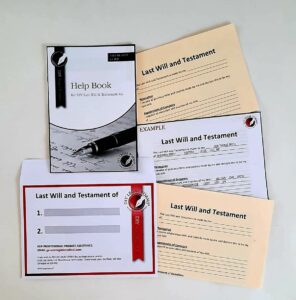Wills – including DIY wills – are required to be signed, dated and formally witnessed. But what happens when they aren’t?
Peter Boyle – a Central Queensland business owner – was 81 when he died in September 2020 in Rockhampton survived by his de facto partner of 36 years, Deborah Jaensch and three children from a former 24-year marriage: Mark, Melissa and Allison.
 Peter’s estate was not large. It consisted of $40,000 cash in a safe, some gold bullion, forklifts, cars, a light aircraft and very run-down business premises at Wharf Street (not to be confused with Quay Street) in Rockhampton. There were also creditors totalling $190,000 as computed by Deborah who was also Peter’s accountant.
Peter’s estate was not large. It consisted of $40,000 cash in a safe, some gold bullion, forklifts, cars, a light aircraft and very run-down business premises at Wharf Street (not to be confused with Quay Street) in Rockhampton. There were also creditors totalling $190,000 as computed by Deborah who was also Peter’s accountant.
There was a contest between Deborah – who produced a DIY will made in September 2016 – and Allison who claimed an unwitnessed and undated will found among Peter’s papers after his death was made later and should be relied on.
Deborah’s document met all the formal requirements: Peter had signed it in front of two witnesses and it appointed 2 executors.
Its deficiency was that the list of specific gifts was difficult to read, other than a gift of the gold bullion and silver to Deborah and his three children equally. It also lacked a direction as to whom the residue of the estate should be paid.
Those deficiencies did not affect the will’s validity but would make the administration of the estate more difficult and costly than it otherwise should have been.
The couple departed for a 3-week holiday in France the day after Peter made that will.
As proved to be important, just over a year later at the start of October 2017 Peter and Deborah went on another overseas trip, this time to Japan.
Allison gave evidence in the dispute that came before Justice Graeme Crow in Rockhampton that Peter called to tell her about the forthcoming Japan holiday and that “Jack Barnes knows what to do” in relation to his affairs in the event of some catastrophe.
She swore that the document she claimed to be Peter’s last will was found in an envelope marked in Peter’s writing “Mr Jack Barnes – Only to be opened upon my being deceased or missing. Peter H Boyle”.
That document was headed “Last Will and Testament”; appointed Jack Barnes as executor; directed his business to continue as a trust; and divided the estate four ways between Mark, Melissa, Allison and Deborah.
Peter had signed this “Will” and although it appeared to clearly set out his testamentary intentions, it was undated and unwitnessed.
Justice Crow held that the words “Last Will and Testament” and Peter writing in the witness’s name “Sue” twice on the document demonstrated his “intention that the subject document would, without more on his part, operate as his will”.
His honour was assisted in that conclusion by Allison’s evidence that her father left matters to the last minute, and that the document was likely made just prior to him calling Allison to tell her about his trip to Japan “just as he had done prior to his holiday in France”.
He ordered that that informal will was the last valid testamentary disposition made by Peter and that a Grant of Letters of Administration for that will be issued in Allison’s favour.
The case is demonstrates some of the problems that can arise and extra costs that are incurred by not seeking out specialised legal input for the preparation of a will.
In the Will of Peter Hamilton Boyle [2022] QSC 178 Crow J, 30 August 2022




